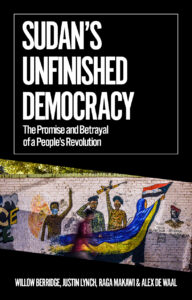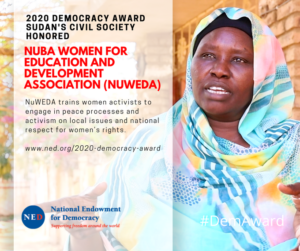Declaring that the fighting in Sudan “must end,” President Biden signed an executive order Thursday authorizing sanctions on people who “threaten the peace, security or stability” of the country, undermine its democratic transition, use violence against civilians or commit serious human rights abuses, The Post reports.
Some activists will complain that the moves come too late to change the behavior of the military protagonists of the conflict.
 Targeted sanctions, seizure of assets, prosecution by the ICC, and material support for Sudan’s democratic movement are imperative, the National Endowment for Democracy’s Africa Director Dave Peterson warned last year. The future of democracy as a political system – a priority that the Biden administration has touted, most recently in President Joe Biden’s Summit for Democracy — is at stake.
Targeted sanctions, seizure of assets, prosecution by the ICC, and material support for Sudan’s democratic movement are imperative, the National Endowment for Democracy’s Africa Director Dave Peterson warned last year. The future of democracy as a political system – a priority that the Biden administration has touted, most recently in President Joe Biden’s Summit for Democracy — is at stake.
The starkest warning about the destructive potential of the war in Sudan came from a former leader, who until recently drove the country’s hopes for democracy, The Times adds:
Fighting between rival military factions erupted on April 15. If it descends into a full-blown civil war, it will be “a nightmare for the world” on par with the worst recent conflicts in the Middle East, Abdalla Hamdok, a onetime Sudanese prime minister, warned this week.
“Syria, Libya, Yemen will be small play” in comparison, said Hamdok, who was ousted 18 months ago by the same generals now battling for control.
 Both the Sudanese Armed Forces (SAF) and the Rapid Support Forces (RSF) see the struggle as existential and have little interest in ending the fighting, adds Suliman Baldo, Executive Director of the Sudan Transparency and Policy Tracker. They are battling over power, control, and the kleptocratic networks that allow them to extract the country’s resources to both enrich themselves and buy off supporters to ensure the continuity of the system.
Both the Sudanese Armed Forces (SAF) and the Rapid Support Forces (RSF) see the struggle as existential and have little interest in ending the fighting, adds Suliman Baldo, Executive Director of the Sudan Transparency and Policy Tracker. They are battling over power, control, and the kleptocratic networks that allow them to extract the country’s resources to both enrich themselves and buy off supporters to ensure the continuity of the system.
“We kind of pretended there was a transition when there wasn’t one,” said J. Peter Pham, a distinguished fellow at the Atlantic Council and a former U.S. special envoy for the Sahel. “We should have been engaging both parties with a plan to move things along rather than wagging fingers at them.”
Regional and international actors are key in enabling – or preventing – the development of the crisis into a protracted civil war with regional dimensions, argues the The best chance of halting a slide into civil war lies in a united front of Western and regional powers, with Sudanese civil society groups putting pressure on the warring generals for a permanent ceasefire. And a return to a civilian-led transition.
As civilians and foreign nationals flee Sudan amid the growing civil war between the army and a major paramilitary organization, one expert warns that prolonged fighting increases the risk that religious extremists and other armed groups could join the fray, imperiling not just the country’s stability but that of its neighbors, reports suggest.
 “Sudan has a number of tribal leaders capable of fielding well-armed militias,” Federico Manfredi Firmian, a lecturer at Sciences Po Paris, told Middle East Policy. “There is also a risk that Islamist groups of Salafi-jihadi inspiration could seize the opportunity to establish a presence in a highly strategic country located between the Sahel and the Horn of Africa.
“Sudan has a number of tribal leaders capable of fielding well-armed militias,” Federico Manfredi Firmian, a lecturer at Sciences Po Paris, told Middle East Policy. “There is also a risk that Islamist groups of Salafi-jihadi inspiration could seize the opportunity to establish a presence in a highly strategic country located between the Sahel and the Horn of Africa.
“The potential for a complete collapse of the Sudanese state at this point is very high,” he adds.
In an article for Middle East Policy, Firmian and coauthor Osman Mirghani highlight several developments that led to the military’s seizing power from the transitional government in late 2021: Islamist terror attacks in Khartoum; the Beja Uprising in eastern Sudan, which caused major shortages of wheat and fuel; and a failed coup attempt by a small number of officers, which gave the military an excuse to expand its control.







